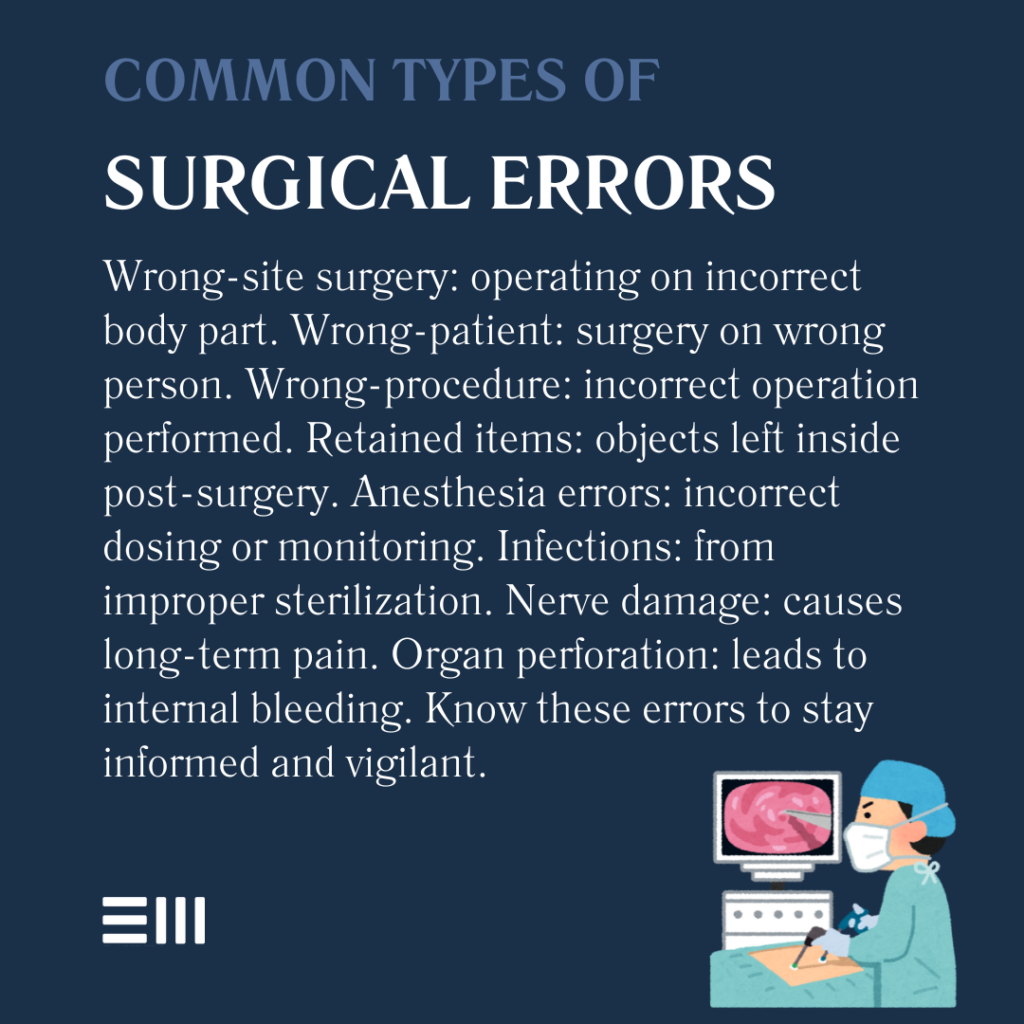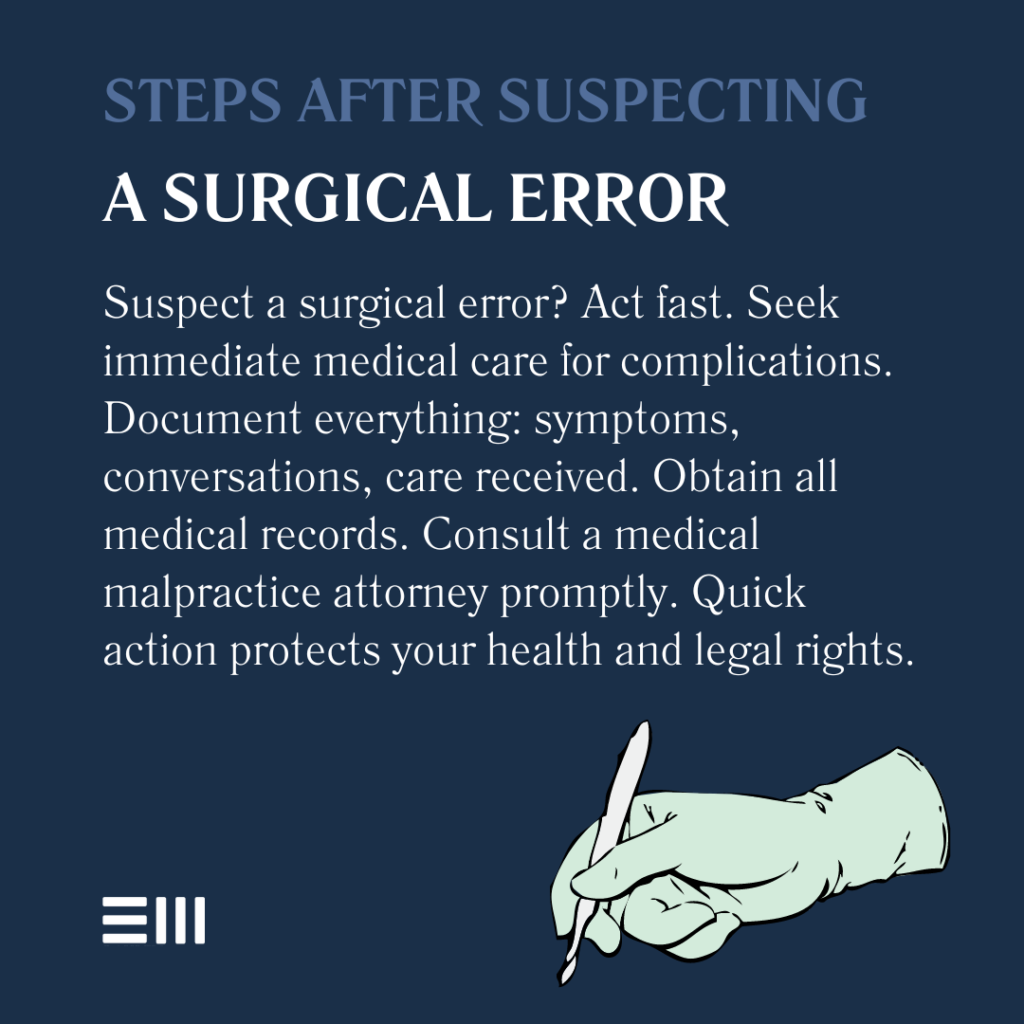
Did you know that approximately 4,000 preventable surgical errors occur in the United States each year?
These errors, often referred to as “never events,” can have devastating consequences for patients and their families.
In Alabama, understanding surgical errors, their impact, and your legal options is crucial for protecting your rights and seeking justice.
Common Types of Surgical Errors
Surgical errors encompass a wide range of mistakes that can occur before, during, or after a surgical procedure.
These errors can result from various factors, including miscommunication, inadequate planning, or human error.
Let’s explore some of the most common types of surgical errors:
- Wrong-Site Surgery: Wrong-site surgery occurs when a procedure is performed on the wrong part of the body. This can include operating on the wrong organ, limb, or side of the body. While it may seem unbelievable, wrong-site surgeries happen more often than one might think.
- Wrong-Patient Surgery: In some cases, a surgeon may operate on the wrong patient entirely. This devastating error can occur due to miscommunication or confusion in patient identification protocols.
- Wrong-Procedure Surgery: Wrong-procedure errors involve performing the incorrect surgical procedure on a patient. For example, a patient scheduled for an appendectomy might instead receive a gallbladder removal.
- Retained Surgical Items: Surgical tools or materials left inside a patient’s body after surgery are known as retained surgical items. These can include sponges, needles, or even larger instruments, potentially causing severe complications.
- Anesthesia Errors: Anesthesia errors can range from administering too much or too little anesthesia to failing to monitor a patient’s vital signs during surgery. These mistakes can lead to serious injuries or even death.
- Surgical Site Infections: While not always due to negligence, surgical site infections can sometimes result from improper sterilization techniques or inadequate post-operative care.
- Nerve Damage: Accidental nerve damage during surgery can cause long-term pain, numbness, or loss of function in affected areas.
- Organ Perforation: Unintended perforation of organs or blood vessels during surgery can lead to internal bleeding, infection, and other life-threatening complications.
Understanding these common surgical errors is the first step in recognizing potential malpractice and protecting your rights as a patient in Alabama.

Consequences of Surgical Errors
The consequences of surgical errors can be far-reaching and life-altering. Patients who experience surgical errors may face the following.
Physical Consequences
Physical consequences of surgical errors can range from minor complications to severe, life-threatening conditions.
These may include:
- Chronic pain;
- Disability or loss of function;
- Need for additional surgeries;
- Infections;
- Organ damage; and
- Disfigurement.
Emotional and Psychological Impact
The emotional toll of surgical errors can be just as devastating as the physical consequences. Patients may experience:
- Depression and anxiety;
- Post-traumatic stress disorder (PTSD);
- Loss of trust in healthcare providers;
- Reduced quality of life; and
- Strained relationships with family and friends.
Financial Burden
Surgical errors often result in significant financial hardship for patients and their families.
Additional costs may include:
- Extended hospital stays;
- Rehabilitation and therapy;
- Lost wages due to inability to work;
- Long-term medical care and medications; and
- Future surgeries to correct the error.
Understanding the potential consequences of surgical errors highlights the importance of seeking legal recourse when medical negligence occurs.
Legal Recourse for Surgical Errors in Alabama
If you or a loved one has been a victim of a surgical error in Alabama, you may be entitled to compensation through a medical malpractice lawsuit. Here’s what you need to know about pursuing legal action:
In Alabama, the statute of limitations for medical malpractice claims is generally two years from the date of the injury or the date the injury was discovered. However, there are exceptions to this rule, so it’s crucial to consult with an experienced attorney as soon as possible.
Proving Medical Negligence
To successfully pursue a medical malpractice claim in Alabama, you must prove:
- A doctor-patient relationship existed;
- The healthcare provider breached the standard of care;
- The breach directly caused your injury; and
- You suffered damages as a result.
Damage Caps
Alabama does not currently impose caps on compensatory damages in medical malpractice cases. However, punitive damages are capped at $1.5 million or three times the compensatory damages, whichever is greater.
In most surgical error cases, expert testimony is required to establish the standard of care and how it was breached. Your attorney will work with medical experts to build a strong case on your behalf.
Potential Compensation
If your surgical error case is successful, you may be entitled to compensation for:
- Medical expenses (past and future);
- Lost wages and loss of earning capacity;
- Pain and suffering;
- Emotional distress; and
- Loss of enjoyment of life.
Understanding your legal rights and options is crucial when dealing with the aftermath of a surgical error in Alabama.

Frequently Asked Questions About Surgical Errors in Alabama
Navigating the aftermath of a surgical error can be overwhelming, and you likely have many questions. Here are answers to some of the most common inquiries we receive about surgical errors in Alabama.
Can I Sue for a Surgical Error if I Signed a Consent Form?
Yes, you may still have grounds for a lawsuit even if you signed a consent form. Consent forms do not protect healthcare providers from liability for negligence or substandard care.
How Long Does a Surgical Error Lawsuit Take in Alabama?
The duration of a surgical error lawsuit can vary widely depending on the complexity of the case and whether it settles or goes to trial. Some cases may resolve in a matter of months, while others can take years to conclude.
What if the Surgical Error Resulted in Death?
If a surgical error results in death, the deceased’s family may be able to file a wrongful death lawsuit. In Alabama, wrongful death claims must be filed by the personal representative of the deceased’s estate.
How Much Does It Cost to Hire a Medical Malpractice Attorney in Alabama?
Most medical malpractice attorneys in Alabama work on a contingency fee basis. This means you don’t pay any upfront costs, and the attorney only gets paid if they win your case, typically taking a percentage of the settlement or verdict.
Preventing Surgical Errors: What Patients Can Do
While healthcare providers bear the primary responsibility for preventing surgical errors, patients can take steps to protect themselves.
Ask Questions
Don’t hesitate to ask your surgeon and medical team questions about your procedure, potential risks, and what to expect during recovery.
Verify Information
Confirm your identity, the procedure you’re having, and the surgical site with your medical team before the operation.
Bring an Advocate
If possible, have a family member or friend accompany you to pre-operative appointments and be present on the day of surgery to help communicate with the medical team.
Mark the Surgical Site
When appropriate, work with your surgeon to mark the correct surgical site before the procedure.
Provide a Complete Medical History
Ensure your medical team has your full medical history, including allergies, medications, and previous surgeries.
Follow Pre-operative Instructions
Carefully follow all pre-operative instructions provided by your medical team to reduce the risk of complications.
Seeking Justice for Surgical Errors
Experiencing a surgical error can be a life-altering event, leaving you with physical pain, emotional trauma, and financial burdens.
If you or a loved one has been a victim of a surgical error in Alabama, it’s crucial to take action to protect your rights and seek the compensation you deserve.
At Baxley Maniscalco, we understand the complexities of surgical error cases and the devastating impact they can have on patients and their families.
Our experienced team of medical malpractice attorneys is dedicated to fighting for justice on behalf of those affected by surgical errors in Alabama.
Don’t let the consequences of a surgical error define your future. Contact Baxley Maniscalco today for a confidential consultation.
Can't find what you're looking for? Search our site below.










